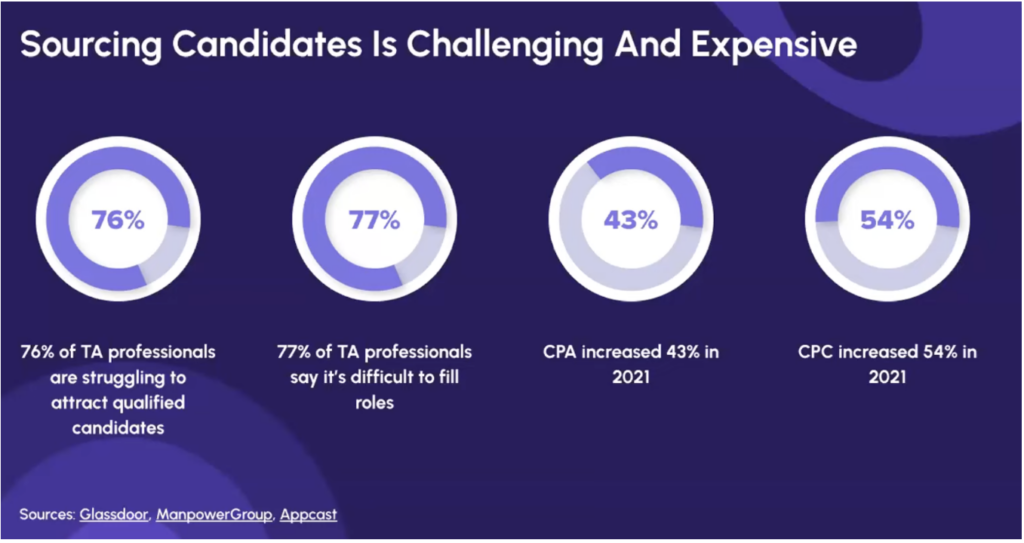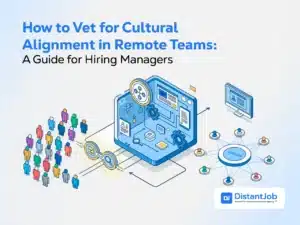Finding remote developers is easier said than done. The main roadblock for most is not having the resources and strategies to hire the right talent that suits your company’s needs. We should know this after recruiting remote software engineers for more than 15 years. You have to ensure your developer is technically qualified and committed to working. So, how do you hire right from the start? This guide will help you find, hire, and retain the best software talent.
1. Define your Ideal Candidate
Before writing a job ad and post it everywhere you can think of, the number one thing you need to do is define your ideal candidate. What does your dream developer look like? Which traits do you need this person to have?
Defining the job position is about knowing what this person will be doing and analyzing the person beyond their technical tasks. When you hire someone to work for your company, you expect them to understand your culture because it reflects on their job, and therefore, on results.
2. Craft Job Descriptions That Attract Candidates
No secret here, right? You won’t get your dream remote developers if you don’t tell them what you expect from them.
Be specific about the role’s responsibilities, required skills, and experience level. Include technical and interpersonal skills, such as proficiency with virtual collaboration tools and excellent written communication skills.
In the job description, provide an overview of your company that outlines the mission, culture, and any other standout aspects of your organization. Explain what makes it a great place to work, as this will help attract potential job seekers.
3. 🔍 Forget the job boards – time to go hunting!
The best developers aren’t scrolling job boards – they’re already employed. Your mission: find them where they hang out and make them an offer they can’t refuse.
- Recruitment agencies – Let the pros do the hunting. Quality candidates in 2 weeks, paperwork included.
- Developer communities – GitHub, Stack Overflow, Reddit, Hacker News. Lurk, contribute, then strike.
- LinkedIn – 900M profiles. Add the hiring badge, slide into DMs, check their connections.
- Skip freelance platforms – Freelancers juggle clients and work for themselves, not you.
- Employee referrals – Your team knows other developers. Offer bonuses, get recommendations.
- Social media – Get employees posting your openings on their personal accounts.
- Layoff hunting – Monitor “open to work” badges. Recently laid-off = motivated and available.
The reality: Top talent isn’t looking for you. You need to hunt them down.
4. Interview Remote Developers
Interviewing candidates gives you the first glance into a developer’s skills and experience. However, besides only asking them questions keep in mind that testing is a must. Give them one project to start and see how they manage it.
The project you assign may take a few hours or a few days. But seeing tangible results instead of predicting how the developer candidate might deliver can be a valuable and illuminating part of the remote hiring process.
A good practice is to make team interviews. Especially if you are looking for a dev that will be working in a team with other developers. Having team interviews will help you make an objective decision regarding if a candidate will be a great employee or if the team is looking for something different.
5. Assess Remote Working Skills
Since you’re hiring for a remote role, it’s important to assess the candidates’ ability to work independently and effectively communicate with team members.
Not everyone is suitable for remote work, so it is important to ensure candidates enjoy this type of dynamic, where work happens mostly asynchronously and they do not need to rely so much on other team members.
You’re looking for skills such as communication, time management, collaboration, self-motivation, and adaptability.
6. Money talks, but benefits close the deal
Throwing cash at developers isn’t enough anymore. They want the whole package – flexible hours, remote work, unlimited PTO, and actual work-life balance.
Remote developers especially care about freedom and flexibility over fat paychecks. Lead with the lifestyle, not just the salary.
In this stage, be transparent about compensation and the benefits you offer, as well as provide a clear understanding of the role and your expectations.
7. You found your developer. Now don’t screw it up.
Congratulations, you’ve landed the perfect remote developer. But here’s where most companies drop the ball: they skip the onboarding and wonder why nothing gets done.
The onboarding meeting is everything. Skip it, and even the world’s best developer will spin their wheels on meaningless tasks.
Remote developers can’t read your mind or overhear office conversations. They need crystal-clear direction from day one – what you’re building, why it matters, and exactly what success looks like.
No context = no results. Give them the full picture or watch them build the wrong thing perfectly.
Your company’s success depends on one thing: everyone knowing what they’re supposed to be doing and why it matters.
8. Time Zone Tactics
Stop seeing time zones as obstacles – they’re your secret weapon for 24/7 productivity.
Hire smart across zones and watch your code get written while you sleep. Pick complementary time zones for smoother handoffs and fewer “waiting for replies” delays.
The remote hiring reality: Global talent pool + strategic time zone planning = non-stop progress on your projects.
9. Legal Compliance & Data Security
Don’t let legal nightmares kill your remote dream team. North American companies must ensure compliance with data security protocols and provide safe working environments for remote employees. Set up proper contracts, IP protection, NDAs, and data security measures before your developer writes their first line of code.
10. Payment & Tax Infrastructure
Figure out how you’re actually going to pay your remote talent without breaking international banking laws. Whether it’s through an Employer of Record (EOR), contractor agreements, or direct international transfers, get your payment system locked down before you make any offers. Nobody works for free, and nobody wants payment delays.
I recommend paying your new developer before the month ends.
Is The Process of Hiring Remotely Expensive?

Hiring developers can be expensive, and the cost can vary depending on several factors, such as the company’s location, the developer’s experience level, and the demand for developers in the particular field.
A major challenge is the sheer size of the remote developer market, which is estimated to be between 5.5 million and 6 million professionals, according to Glassdoor Economic Research.
The two major factors that lead to higher costs of recruiting remote workers include:
- Increased cost for advertising job postings – Advertising job postings tend to cost upwards of 39% more than it does for on-site positions.
- Recruiting from a remote pool requires a higher level of decision-making skills and experience.
- Longer recruiting process for remote software developers—The process of recruiting, interviewing, and onboarding a remote employee takes 2.5-3X longer than recruiting on-site employees.
While hiring remote developers through third-party organizations can add up an extra cost, depending on the organization itself and their experience, these, in the long term, can be more efficient as they will seek out remote developers in locations where the cost of living is lower.
For instance, hiring a senior remote developer in the U.S. is around $100,000 per year (if not more), while hiring skilled Eastern European developers costs between $60,000 to $90,000 per year.
The added costs of recruiting a remote dev team need to be weighed against the potential benefits of managing remote workers. Many companies are finding that the cost of remote workers is well worth it when one considers the long-term benefits of having a well-trained, remote team that can handle more complex tasks in a shorter period.
Conclusion
Follow these 10 guidelines, and you will have the kind of quality programmers every employer is looking for while getting the full benefits of building a remote team.
But if you find it overwhelming to do it on your own, don’t worry. Leave it to us. We will take on the challenge and commit to finding you the developer you need in just 2 weeks.
Our specialized recruitment agency offers access to top talent, a customized recruitment process, and ongoing support to ensure a successful hire. By partnering with us, you can save time and money while you can focus on other aspects of your business, while we do the heavy lifting such as recruiting, vetting and interviewing.
We provide a customized recruitment process based on your needs and preferences and can get you the perfect match in less than 2 weeks. Interested? Contact us today online or visit our offices in Montreal.





